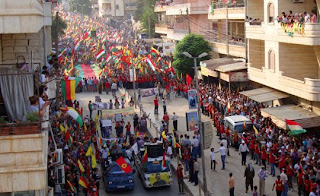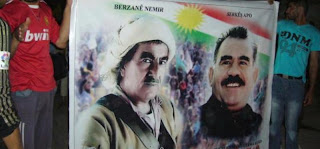
The artificial boundaries in the Middle East, that were drawn after the WWI by the colonial empires of that era, including France and the UK, are now changing. Despite the massacres, attempted genocide and the everyday political and cultural threats, the Kurds are today taking center stage in the what some say is the "Kurdish Spring" and all of us in the West are witnessing history in the making! Following the developments in Syria, where Assad's forces were forced to confront the rebels, and the decision by the regime to abandon this region and leave it entirely to the Kurds, the Kurdish spring began.
In the photos which were published on infognomonpolitics we see historical moments in the making as thousands of Kurds celebrate their freedom while carrying flags of the Kurdish Republic of Kurdistan and the PKK. We also see portraits of Ozalan Mola and Mustafa Barzani, who is the historical leader of Southern Kurdistan, and father to the president of the autonomous Kurdistan.

Today the Kurds took to the streets and marched in joy shouting "The Supreme Council of Kurdistan is our representative." The marches were held in the cities of Kobani, Afrin, Derik, Amude and Tırbesıpi, which are now operated by the Kurds themselves.
Syrian Kurdistan, or Western Kurdistan as it is known by the Kurdish people, has always been a base for resistance movements as well as intellectuals since it was always considered as a strategic partition between Turkey, Syria, Iraq and Iran. The boarders here were determined by France and the UK after the first world war so the plight of the Kurdish people from now on is definitely now expected to create massive migraines to French and British officials.
After the revolt launched in mid-March 2011 in Syria, the Kurds have refused to engage in a war fought between the armed and political groups trained and supported by the West and the trio Qatar-Turkey-Saudi Arabia, and the Assad regime.
A bit of trivia for you all - In 2004, more than 30 Kurds were massacred in Qamishli, the largest Kurdish city in Syria, before the eyes of the world. "Opponents" of today were then officials of the regime. Today, these opponents are still refusing the legitimate rights of the Kurdish people.
Established in 2003, the Kurdish party PYD (Democratic Union Party) has been working for several years on the autonomy of this area. As of March 2011, the Kurds began working towards this goal, and opened PYD-language schools, established new communities, towns and villages as well as created councils and committees of self-defense to protect its population.
The Syrian Kurdish population is estimated at some 3.5 million, or 15% of the population, including half a million in Damascus and a further 600,000 in Aleppo.
The Kurds are well organized and are the only ones who have a concrete vision for Syria. Conscious of destabilization and division attempts against Syrian Kurdistan, the main Kurdish formations, the Council of the People of Kurdistan, which includes several Western Kurdish parties whose PYD and Syrian Kurdish National Congress (CNK), etc. decided to join forces in a single block after discussions in Iraqi Kurdistan between July 9-10 on how to face this. The result: An accord was signed in the presence of President of Iraqi Kurdistan, Massoud Barzani.
The takeover of the Syrian Kurdistan
After a long preparation, the Kurds launched an assault on July 19 against all institutions of the Baath regime, which is in power for the past four decades, taking control of four towns, Kobani, Efrin, Derka Hamko and Amude.
On July 20, the creation of Popular Defence Units (YPG) was announced. "Our main goal is to defend the national interests of the Kurdish people. We announce to our people that we are able to protect the entire region, "said YPG in a statement.
In the aftermath, the movement of the democratic society of Western Kurdistan (VTE-MED), an umbrella organization of the main Syrian Kurdish formations, the most influential PYD, called on his side the Arab, Armenian, Assyrian-Chaldeans to support the Kurdish people. The movement promises to protect these people, and supports the idea of a united and democratic country where various minorities can live together.
On July 25, the Syrian Kurdis announced the creation of the Supreme Council that will now represent the Kurdish people both nationally and internationally.
Clashes between the regime and Kurds
On July 26, Assad regime attacked Kurdish activists in the neighborhood of Tariq Aldab in Aleppo, killing three people and wounding 11 others. In retaliation, Kurdish activists launched an attack against the police in the district of Sakan Shababi in Aleppo, located between two Kurdish neighborhoods, and Ashrafia Sheikh Maqsood. Popular defense units announced the killing of six members of the Syrian security forces and threatened further retaliation on Syrian attacks against the Kurdish people.
Open threats of the Turks
The Kurdish Spring, is as expected a big headache for Turkey. Denying all legitimate demands of the Kurdish people in Turkey, Ankara wants to suppress them anywhere, even on the moon.
On July 26, Turkish Prime Minister Recep Tayyip Erdogan said the mobilization of the Syrian Kurdish was "terrorism" and he threatened to intervene. "This is what we have done and continue to do in Iraq. If we run air strikes from time to time against these terrorist areas (we will better) defend ourselves with these measures," he said, but he never once mentioned the massacres that could be committed by such air strikes. And obviously, Turkey does not address their tactics against the Kurdish people over the years since now it looks like it is backfiring on them since it is unifying these people even more. Turkey regularly bombs areas that are controlled by the PKK in northern Iraq, or in Southern Kurdistan, without any success.
"Inevitably there will be a response from us about this attitude," said Erdogan at a news conference before leaving for London, evoking the possibility of creating a buffer zone in Syrian territory as a pretext for facing the PKK.
Turkey has also mobilized its paramilitary associates to stop the Kurdish movement. On July 23, Abdel Basset Sayda, the head of the Syrian National Council (CNS) (which was formed in Costantinopole) stressed that "the Syrian regime gave this region to the PKK or PYD and left." Without the consent of the Kurdish people, this leader of the CNS did not hesitate to say that the Kurds are not on the side of the PYD but of the CNS.
On its part, a member of the Turkish paramilitary group (based in Antakya) by the name of Ubed Muse, demanded weaponry to fight the PKK, telling AFP: "If only we could get support in weapons from Turkey." He is leading a group of 45 men and he is not ashamed to talk about the removal of a movement that is fighting for the legitimate rights of the Kurdish people. He should be reminded that Turkey has not been able to destroy the PKK for the past 30 years, even with all the economic, diplomatic and military support of the West.
On July 26, the government in Ankara received the defected General Tlas Manaf, a member of the first circle of Syrian power. He is regarded by the Turks as the future leader of the Syria. In short, Ankara did everything to suppress Kurdish aspirations, relying on its accomplices.
The Kurdistan Workers Party (PKK) which is supported by millions of Kurds in Kurdistan as well as by its diaspora has warned Turkey about the threats it has made saying that the Kurds will mobilize everywhere against the Turkish state, in case there is aggressive intervention against the Syrian Kurdish.
Expressing solidarity to the Syrian Kurdish, the organization notes that the Kurds of Turkey will not remain with their arms-crossed in the face of such aggression and they even described Erdogan's statements as "profound racism" and bullying towards the Kurdish people.
Either autonomy or chaos
Plans based on a single race, and religion are doomed to fail and the Kurdish movement offers a democratic confederation and brings a resolution to long-standing ethnic and religious problems.
The Kurds, are the largest stateless people in the world with an estimated population of 40 million, who are simply not willing to live without a national status any longer.
The expected aggression will not reduce the people's march to their autonomy and artificial boundaries are no longer sustainable. A new approach is necessary because Turkey's anti-Kurdish alliance between Iran, Syria and Turkey has also collapsed. Pursuing the same policy will only lead to chaos that will make Turkey lose in the end.
Combined Reports
Original Article in Greek and French At:
http://infognomonpolitics.blogspot.gr/2 ... .html#more
http://www.actukurde.fr/actualites/300/ ... urdes.html




